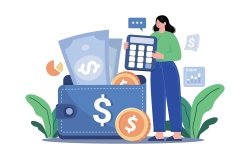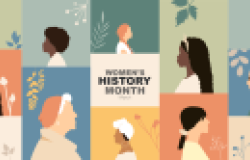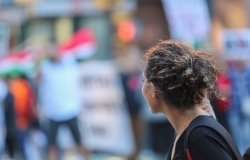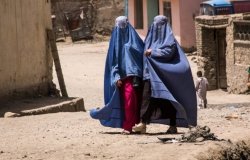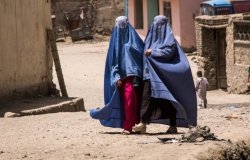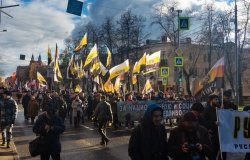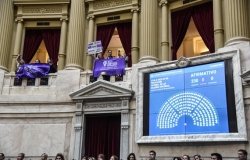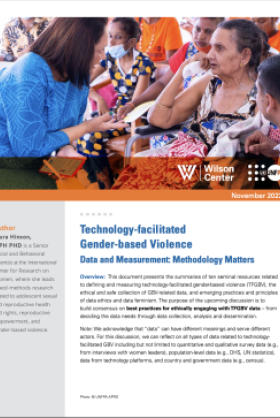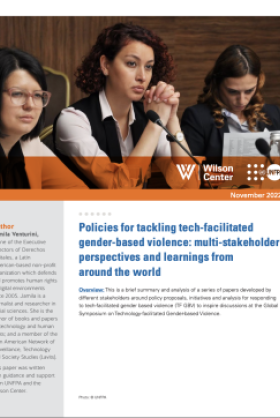The White House of the Future is Filled with Women
“We need more women at the policy table. More women leaders would connect the dots through comprehensive discussions linking all policy spheres and branches of government. Unity not exclusion will make America great,” says Gwen Young.
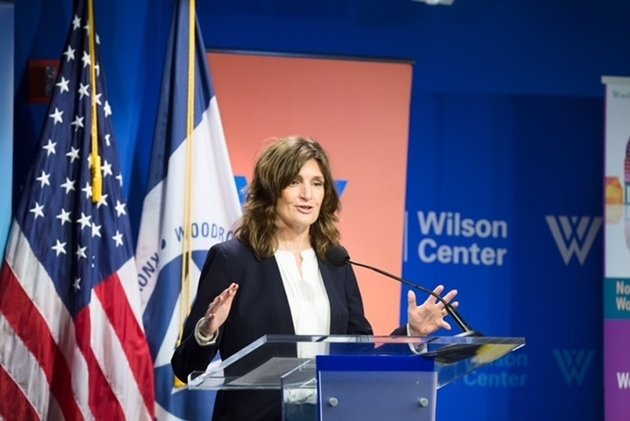
What would a White House run by women feel like?
“Powerful and exciting. No doubt there would be infectious energy- talk about being and making America great!”
It’s Gwen K. Young’s mission to fill 1700 Pennsylvania Avenue with historic numbers of women this election cycle, as well as state houses, mayoral mansions, police precincts and congressional seats dotting the country. One county seat after another, she will chip away at political parity with a goal to reach 50% by 2050.
“We need more women at the policy table. More women leaders would connect the dots through comprehensive discussions linking all policy spheres and branches of government. Unity not exclusion will make America great.”
One year ago, Young was Country Director for an international NGO overseeing agricultural development and public health projects in Senegal. From Senegal to the US, Young was hand picked to run the Women in Public Service Project (WPSP) at the illustrious Washington D.C. think tank, the Woodrow Wilson Center, by Jane Harman, long-time former California Congresswoman, foreign policy expert, and the first woman to lead the institution.
The WPSP was launched by Hillary Clinton five years ago in partnership with the Seven Sisters Colleges. It includes a bi-partisan, global community of leaders including former First Lady Laura Bush, the first-ever Ambassador-at-large for Global Women’s Issues under then Secretary of State Hillary Clinton, Melanne Verveer, Australian Minister for Employment and Minister for Women Michaelia Cash, Farah Pandith, the first ever Special Representative for Muslim Communities under President Obama, and more than 90 global institutions. https://womeninpublicservice.wilsoncenter.org/
Gwen’s ambition is to be the go-to public-private partnership platform to find top women for top slots not just in Washington, D.C. but around the world.
“The ultimate goal is to have 187 countries sign onto this movement and feed the pipeline of women heading to the policy table. The more varied that pipeline is the better – you only need to look at the hundreds of women trained by WPSP from every walk of life and every corner of the world. The ethos and values of the Seven Sisters Colleges: no limitations, resilience, tolerance and transparency, remain at the core of our mission.”
To drive the mission, Young will leverage a cutting-edge index being developed and the metrics, network, deep political insight into the campaign transitions nationally and a tireless passion to do so.
“But there are challenges in our way: social cultural norms, people being overly critical of women, women’s desire to be perfectionists, and the deep burden on women’s time.”
Women’s issues and legislation around family has had minimal progress since the 1960s compared to every other policy area. Women need comprehensive maternity leave policies and subsidized daycare to even begin to have the same opportunities in politics as men.
Girls are still often raised socially to avoid risk and failure. Politics is the daily embodiment of both. Women are also judged unfairly and acutely in the public eye- their hair, their clothes, the way they raise their children, whether they’re married or not, every aspect of their private lives is machete-ed to mince meat in the blogosphere.
“Politics has a bad name today. It’s tied to corporate greed and political PACs in America, and nepotism in places like Africa and South America. Young women want to learn policy and change the world, but they won’t negotiate with their morals or sell their beliefs to do so.”
Young, a graduate from Harvard’s John F. Kennedy School of Government and a human rights lawyer, has a 20-year career in international public service and knows how to make real change last.
She has spearheaded the global expansion of NGOs into new countries, and developed policies and procedures to ensure that interventions are making a direct impact. Most importantly she has a striking human touch: she’s adept at teaching and supporting women, and those lacking opportunity or feeling marginalized, to approach challenges with bravery.
“The tools needed are to know and have confidence in yourself. You need to know your skills and what you like and are able to do. You then need to be confident enough to tell and show your value to others. Know and own your experience.”
Government needs to be more accessible and connected, and Young plans to combine offline and online tools, social media and an authenticity to tackle the challenge of women’s political parity.
“My grandmother and grandfather always told me: ‘the good we send into the lives of others comes back onto our own’. Compassion, hard work and working for others is what I was taught.”
Combining heart and hard facts, metrics and solutions, is how Young is building a global movement of men and women, young and old, with the Women in Public Service Project.
Together she hopes to not just crack the glass ceiling but to build a new skyscraper with no ceiling, just everlasting stars and open skies.
In the interview below read more about Gwen’s incredible personal story and how you can join her call to action! Follow Gwen @GwenKYoung @WPSProject
The 21st century is often dubbed the century of women’s leadership. One decade in, who do you see as women leaders making change within their nations and how are these women helping other women advance?
Gwen K. Young: Angela Merkel, Michelle Obama and U.S. Ambassador to the United Nations Samantha Power define the 21st century woman for me.
They focus on helping others by promoting women and girls; working on issues such as genocide, foreign policy, economics and not being afraid to talk about and call out people; they are fearless.
What made you go for the WPSP director role?
This is an opportunity to build a global platform and movement for women’s leadership in policy. The credibility of the program with the global goal is what attracted me to this position.
Personally it allows me to bring together my passion for promoting women’s leadership with my skills of building programs and advocacy across the globe.
I know amazing women and I know what they face on a daily basis. As Woodrow Wilson said, when you know what is right it’s your duty to fight for it.
You have an incredibly impressive background- as a lawyer, as part of the Bill & Melinda Gates Foundation and as an authentic activist in equality. How has your past prepared you for this role?
I’ve lived in a variety of cultures and countries. Living cross culturally allows you to appreciate both the differences and similarities. It allows you to test your assumptions and your messaging about you, your values and your goals.
My work has always aligned with my personal goal of equality of opportunity.
One of my most inspiring personal moments was meeting Nobel Peace Prize winner Tawakkol Karman, President Ellen Sirleaf and Leymah Gbowee in Sweden, who all cited the role of women in changing the status quo. Will women’s leadership increasingly become a product of youth engagement?
Yes! People under 30 comprise most of the world’s population today.
Young people are the sources of new ideas and the drivers of real cultural change. We’re living in an inspiring time where young people truly feel they have the power in their own two hands to change their governments and communities without help from authority.
I want to help them increase and understand their power, and translate it into what it really takes to change laws and policy.
What does the year ahead look like for the Women in Public Service Project?
Our theory of change is that if you change institutions and mindsets and empower women then that will put women in leadership positions. Policy and politics is integral to women’s empowerment and also just better societies. I want everyone to know we are out there to make this change!
So I plan to truly “get out there.” I won’t hide behind academic walls, and stay in the D.C. beltway corridors, I want to go to every corner of this country and the globe to listen and learn, then take those learnings back home to the nation’s capital.
I especially want to get a more granular, real understanding on how Millennials view politics, what makes them interested or not and why. This project is building a platform and harnessing the energy of how and why young people can and do go into public service roles. I will go to Dakar, Dubai, Geneva, Dhaka and Mexico City and all across the United States to find out what drives today’s youth.
Creating a clear, comprehensive index is the long term goal. We will have the metrics to evaluate governments across the world on their structure, how they are rewarding their people, how they are using their population, if they are hiring and promoting to maximize inclusion, and giving them these facts in a way that allows them to self-empower and make change.
What have you learned about equality from your own family background?
Gwen K. Young: My family has always treated people equally and worked to ensure that everyone has the same rights. Both of my parents were social workers and teachers, and all of my family has worked to ensure that marginalized groups (immigrants, native Americans, those with less money) have access to the same services from education to banking and financial services.
As the granddaughter of immigrants I learned to treat everyone the same no matter what economic or social background someone came from. Money does not define a person. I also learned to understand the sociocultural environment of others and to respect and treat all people equally. My family defined itself by working hard and applying themselves.
We were also taught to work for and help others that do not have the same opportunity. My grandmother for example was honored in Colorado with a Service for Mankind award for developing the first audio testing for children in schools. The aim was to help identify children with hearing issues including the deaf and insuring they could get the help including hearing aids that they needed.
In your personal life, you also live the joys and challenges of diversity. How does that impact you?
I adopted my son from Ethiopia and have lived over half of my career in various countries in Africa. In this way I have experienced racial, social and economic inequalities. This reinforces my firm belief that everyone should have equal opportunity. Equal access. I see the differences in how people treat you and assumptions people make, as well as “access” to service.
My aim in life personally and professionally is to ensure that people have equal access, know what their opportunities are, and are judged for what they do and their capabilities. I went into law to work for equal access.
In this job my aim is to ensure that capable women are given every opportunity equally capable men are given. It’s as simple as that.
What was it like being a female leader in Senegal?
It was both challenging and empowering. While challenging to gain respect, once you do have it you are given the chance and latitude to use it. I had a lot of freedom as an American and as the leader of an international NGO. People expected me to be both different and progressive. I brought over 15 years of experience and networks in Africa to build a local board and progressive programming.
Work-life balance is a buzzword in America when it comes to women’s issues and career advancement. Do you have it?
I do though perhaps I define balance differently. I am equally busy in both professional and personal circles. I give each my all and with intensity; but also efficiently and always juggling. I try to not sacrifice one for the other, but each has to give.
For example, I don’t work out as much as when I was single, but I still run every day.
At work, I don’t pull all-nighters and perhaps attend less happy hours, but I still give it my all at work and make friends with my colleagues.
You’ve worked with women leaders from radically different cultures – from the Middle East to Sub-Saharan Africa to the Far East. What insight can you give us into the challenges these women face and do you find universal qualities and values in women leaders the world over?
I do find universal qualities in that all women want the same thing: work life balance; amazing things for their family; men, women and institutions to understand their value. What I do know is that how we express our power is different both externally and internally.
Also where we place religion and culture in our definition of who we are may vary. For example, for some women how they dress is an expression of power.
For other women, how you dress is not a direct expression of who you are or your power. In either instance universally, women see power as something they can give to others or can use to help others. The way we define power is uniquely giving and female that way.
What do you think the United States could be doing better to advance women in leadership?
As Gloria Steinem said: “True equality is when men aren’t praised for doing housework anymore.”
Advancing women in business involves figuring out parental leave so that women and men can balance work and family and their work is valued and professional career path can grow even if they take some time off for their kids.
There need to be leave policies to give families the choice about how and when they want to take time with their children, as well we need to reduce the cost of child care as this is a larger expense in terms of % of income in the US than in other countries.
Africa is buzzing with entrepreneurial energy and women entrepreneurs are leading the way there. What can we learn from Africa’s entrepreneurial ethos?
Sometimes we are too rigid in our thinking of how we do something. Africa is a young country, rules are able to be adapted to a situation and this type of flexibility in thinking is important.
But perhaps most impactful is the “community effect”- there’s always a neighbor, cousin, friend to help you with your kids, cook a large dinner and share it, Africans deal with social issues collectively and we’re missing that in America today.
Life is not formal or legislated and rule of law needs to be developed, but African populations are solutions focused.
What is unique about the Woodrow Wilson Center?
The Wilson Center is recognized as the best think tank in the U.S. for transdisciplinary research and the Women in Public Service Project is a cornerstone of this dynamic, open approach.
The Wilson Center is truly nonpartisan and federally funded. This means our views and our objectives are independent. Thirdly we have a truly global reach in terms of doing events and work across the globe. Finally we are a center for scholars with about 90 global scholars every year from across the globe. It is this scholarly and fellow focus that provides the depth and global reach.
Why is the WPSP such an important mission?
Getting policy processes and policies right is the key to economic, social and cultural development.
Awareness, media and digital activism is great but policy needs to be in place to make that activism a reality.
Thus ensuring that the leaders represent the population and contain all views held within a population is critical to making the right policy. It’s also critical to an equal distribution of that policy through services.
Do you think we need to mandate legislation (quotas?) to truly get to political parity soon?
We do need legislation. We cannot rely on will alone.
Quotas in conjunction with other measures can bring women’s voices into political systems where they are otherwise excluded, short-cutting a process that can naturally take generations.
Countries ranging from Norway to Rwanda to India have used quotas successfully, but they cannot work on their own. Other factors - like strong political will, enabling women’s freedom of movement, and networks of support for female candidates - significantly strengthen the effectiveness of quotas.
Quotas are debated but the facts to support them are clear: Women have the right as citizens to equal representation. Women’s experiences are needed in political life. Election is about representation, not educational qualifications.
Women are just as qualified as men, but women’s qualifications are downgraded and minimized in a male-dominated political system. It is in fact the political parties that control the nominations, not primarily the voters who decide who gets elected.
Tolerance and gender equality is a direct product of how we raise our children. How do you teach your son to be aware of these issues?
As a family we discuss all cultures and holidays with equal respect and significance. I do this by choosing books, music and theater form a variety of cultures.
For example, at Christmas we see a theater performance, which shows how cultures across the world celebrate Christmas and the new year through dance. As well I am always changing the type of music we listen too, food we eat and types of people with which we socialize.
I’m trying to show him that people are different in a variety of ways but that understanding, friendship and love are constants.
This article and interview were orignally published on HuffingtonPost.
Related Program

Global Women's Leadership Initiative
The Global Women’s Leadership Initiative has hosted the Women in Public Service Project at the Wilson Center since June, 2012. The Women in Public Service Project will accelerate global progress towards women’s equal participation in policy and political leadership to create more dynamic and inclusive institutions that leverage the full potential of the world’s population to change the way global solutions are forged. Read more

